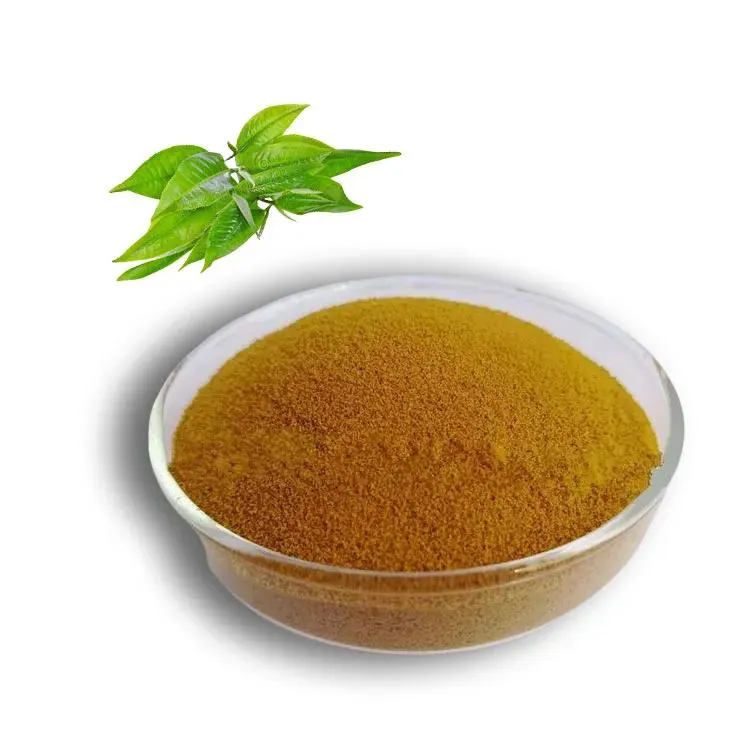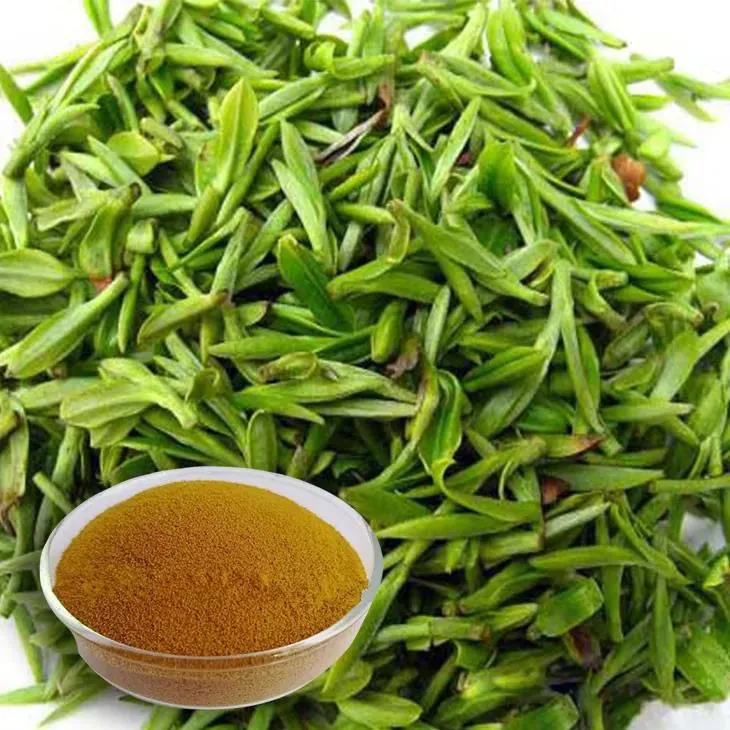- 0086-571-85302990
- sales@greenskybio.com
Green Tea Extract: Benefits, Uses and Possible Side Effects
2024-11-13

Introduction
Green tea has been a popular beverage for centuries, especially in Asian countries. In recent years, Green Tea Extract has gained significant attention in the global market. This extract is rich in various bioactive compounds that are believed to offer a wide range of health benefits. It is also being used in diverse industries, from food and beverage to cosmetics and pharmaceuticals. However, like any supplement or ingredient, it also has potential side effects that need to be considered. This article aims to provide a comprehensive overview of Green Tea Extract, including its benefits, uses, and possible side effects.

Benefits of Green Tea Extract
1. Antioxidant Properties
Green tea extract is highly rich in polyphenols, particularly catechins. The most abundant catechin in green tea is epigallocatechin - 3 - gallate (EGCG). These polyphenols act as powerful antioxidants. Antioxidants are substances that can prevent or slow damage to cells caused by free radicals. Free radicals are unstable molecules that are produced during normal body processes as well as due to environmental factors such as pollution, radiation, and smoking. By neutralizing free radicals, the antioxidants in green tea extract can help reduce the risk of various chronic diseases, including heart disease, cancer, and neurodegenerative diseases.
2. Metabolism Improvement
One of the well - known benefits of green tea extract is its potential to boost metabolism. It contains compounds that can increase thermogenesis, which is the process by which the body generates heat. This increased heat production can lead to a higher rate of calorie burning. For example, EGCG has been shown to activate brown adipose tissue (BAT), which is a type of fat tissue that burns calories to generate heat instead of storing them. By enhancing thermogenesis and activating BAT, green tea extract may contribute to weight management and help in preventing obesity.
3. Heart Health
Green tea extract may have positive effects on heart health. The antioxidants in it can help reduce inflammation in the blood vessels, which is a key factor in the development of atherosclerosis (hardening and narrowing of the arteries). Additionally, some studies suggest that green tea extract can improve blood lipid profiles by reducing LDL (low - density lipoprotein, often referred to as "bad" cholesterol) levels and increasing HDL (high - density lipoprotein, or "good" cholesterol) levels. It may also help in reducing blood pressure, which is another important risk factor for heart disease.
4. Anti - cancer Potential
Research has indicated that the polyphenols in green tea extract, particularly EGCG, may have anti - cancer properties. They can interfere with the growth and spread of cancer cells in several ways. For instance, EGCG can inhibit the activation of certain enzymes that are involved in cancer cell proliferation. It can also induce apoptosis (programmed cell death) in cancer cells, which helps in preventing the growth and spread of tumors. However, it should be noted that while these findings are promising, more research is needed to fully understand the role of green tea extract in cancer prevention and treatment.
5. Brain Health
The antioxidants in green tea extract may also benefit brain health. They can protect brain cells from oxidative stress, which is associated with neurodegenerative diseases such as Alzheimer's and Parkinson's. Some studies have also shown that green tea extract can improve cognitive function, including memory, attention, and learning ability. This may be due to its ability to increase blood flow to the brain and modulate neurotransmitter levels.

Uses of Green Tea Extract
1. In the Food and Beverage Industry
Green tea extract is widely used in the food and beverage industry. It is added to various products such as green tea - flavored drinks, ice creams, yogurts, and baked goods. In these products, it not only provides a unique flavor but also adds a health - promoting aspect. For example, many ready - to - drink green tea beverages on the market contain green tea extract, which is marketed as a refreshing and healthy drink option. Additionally, in some functional foods, green tea extract is added to enhance the antioxidant content and provide potential health benefits to consumers.
2. In the Cosmetics Industry
The antioxidant and anti - inflammatory properties of green tea extract make it a valuable ingredient in the cosmetics industry. It is used in skin care products such as creams, lotions, and serums. Green tea extract can help protect the skin from damage caused by environmental factors, such as UV radiation and pollution. It may also have anti - aging effects, as it can reduce the appearance of wrinkles and improve skin elasticity. In hair care products, it can be used to promote healthy hair growth and prevent hair loss.
3. In the Pharmaceutical Industry
Green tea extract is being investigated for its potential use in pharmaceuticals. Due to its various health - promoting properties, it may be used in the development of drugs for treating chronic diseases such as heart disease, diabetes, and cancer. For example, some pharmaceutical companies are exploring the use of EGCG as a potential treatment for certain types of cancer. However, more research and clinical trials are required to determine its safety and efficacy as a pharmaceutical ingredient.

Possible Side Effects of Green Tea Extract
1. Gastrointestinal Issues
Some people may experience gastrointestinal side effects when taking green tea extract. These can include nausea, vomiting, and stomach upset. This may be due to the high concentration of polyphenols in the extract, which can irritate the lining of the stomach. In some cases, it may also cause diarrhea, especially if taken in large doses.
2. Effects on the Nervous System
Green tea extract contains caffeine, which can have effects on the nervous system. In some individuals, it may cause increased heart rate, jitters, and insomnia. People who are sensitive to caffeine may be more likely to experience these side effects. Additionally, excessive consumption of green tea extract may lead to caffeine overdose, which can cause more severe symptoms such as rapid breathing, tremors, and even convulsions in extreme cases.
3. Interactions with Medications
Green tea extract may interact with certain medications. For example, it can interfere with the absorption of some drugs, such as iron supplements. It may also interact with medications for blood thinning, as it can affect platelet function. People who are taking medications should consult their doctor before taking green tea extract to avoid potential interactions.
Conclusion
Green tea extract offers a wide range of potential benefits, from improving metabolism and heart health to having anti - cancer and anti - aging properties. It is used in various industries, adding value to products in terms of both flavor and health promotion. However, it also has possible side effects that should not be overlooked. People considering using green tea extract, whether in the form of a supplement or in products, should be aware of these benefits and risks. It is always advisable to consult a healthcare professional before starting any new supplement or making significant changes to one's diet or lifestyle.
FAQ:
What are the main benefits of green tea extract?
Green tea extract has several main benefits. One of the key benefits is its ability to improve metabolism. This can potentially help in weight management. Another major benefit is its antioxidant power. The antioxidants in green tea extract can reduce the risk of chronic diseases by combating free radicals in the body.
How is green tea extract used in the food industry?
In the food industry, green tea extract can be used as a natural flavoring agent. It can add a unique taste to various food products. It may also be used as a preservative due to its antioxidant properties, which can help prevent spoilage of food items.
What are the potential side effects of green tea extract?
Some potential side effects of green tea extract include nausea. In certain situations, it may also lead to an increased heart rate. However, these side effects are not common for everyone and may depend on factors such as the dosage and individual's health conditions.
How does green tea extract reduce the risk of chronic diseases?
Green tea extract reduces the risk of chronic diseases through its antioxidant content. Antioxidants in the extract can neutralize free radicals in the body. Free radicals can cause damage to cells and DNA, which is associated with the development of chronic diseases. By reducing the number of free radicals, green tea extract helps in preventing chronic diseases.
Can green tea extract be used in pharmaceuticals?
Yes, green tea extract can be used in pharmaceuticals. It may be used in medications or supplements due to its various health - promoting properties. For example, it could potentially be used in drugs aimed at improving cardiovascular health or in supplements for general well - being.
Related literature
- The Health Benefits of Green Tea Extract: A Comprehensive Review"
- "Green Tea Extract in Modern Medicine: Applications and Considerations"
- "Antioxidant Properties of Green Tea Extract: Implications for Chronic Disease Prevention"
- ▶ Hesperidin
- ▶ Citrus Bioflavonoids
- ▶ Plant Extract
- ▶ lycopene
- ▶ Diosmin
- ▶ Grape seed extract
- ▶ Sea buckthorn Juice Powder
- ▶ Fruit Juice Powder
- ▶ Hops Extract
- ▶ Artichoke Extract
- ▶ Mushroom extract
- ▶ Astaxanthin
- ▶ Green Tea Extract
- ▶ Curcumin
- ▶ Horse Chestnut Extract
- ▶ Other Product
- ▶ Boswellia Serrata Extract
- ▶ Resveratrol
- ▶ Marigold Extract
- ▶ Grape Leaf Extract
- ▶ New Product
- ▶ Aminolevulinic acid
- ▶ Cranberry Extract
- ▶ Red Yeast Rice
- ▶ Red Wine Extract
-
Gynostemma pentaphyllum extract
2024-11-13
-
Marigold Extract
2024-11-13
-
Giant Knotweed Extract
2024-11-13
-
melatonin extract
2024-11-13
-
Acai Berry Extract
2024-11-13
-
Alfalfa Meal
2024-11-13
-
Hawthorn powder
2024-11-13
-
Reishi mushroom extract
2024-11-13
-
Polygonum multiflorum extract
2024-11-13
-
Chasteberry Extract
2024-11-13





















